Politics
MASHATILE UNMASKED | ANC donor – whose director ‘blessed’ Mashatile’s girlfriend – pockets R90m land deal
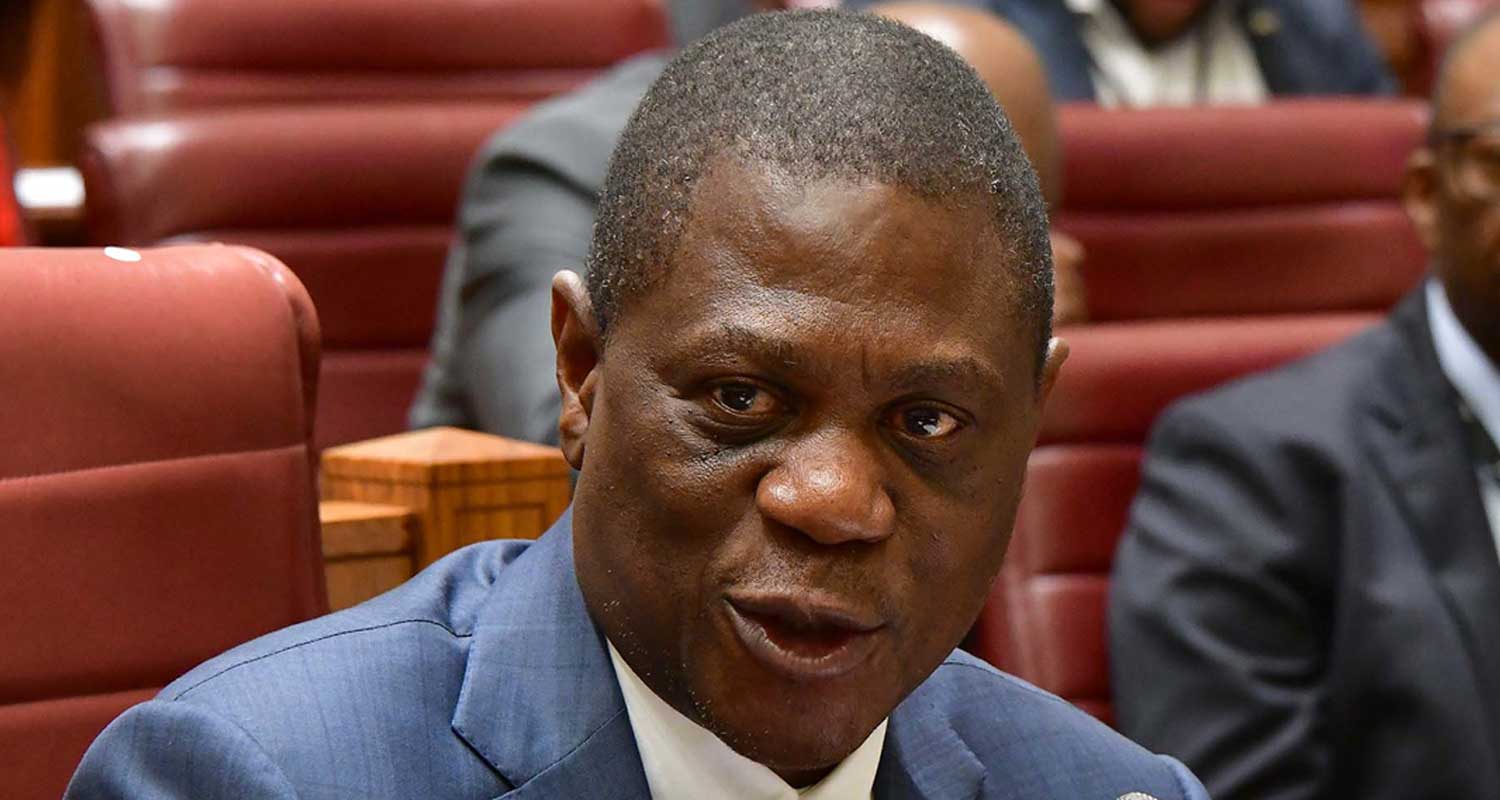
- A company with links to Deputy President Paul Mashatile has pocketed R90 million from a seemingly dodgy land deal with the Gauteng Department of Human Settlements.
- In November 2022, Valumax walked away with R90 million after buying land for R188.7 million and selling it to the department for R278.8 million the same day.
- In 2006, a company acquired by Valumax in 2021 bought a piece of land for R15 million in Diepsloot and sold it to the department for R80 million three years later.
A company that has received billions in government contracts and donated millions to the ANC, and whose director paid for the upkeep of Deputy President Paul Mashatile’s former girlfriend, pocketed R90 million from a seemingly questionable land deal with the Gauteng Department of Human Settlements.
News24 can reveal in November 2022, Valumax, a property development company, walked away with R90 million after acquiring 26 land pieces from 18 property owners for R188 768 300 and then selling them to the department for R278 848 000 on the same day.
One of Valumax’s directors – Teddy Greaver – is an admitted friend of Mashatile.
In August last year, News24 reported between March and November 2022, Greaver made four payments, totalling R900 000, to Umcebo Projects.
Umcebo Projects belongs to Gugu Nkosi, a former girlfriend of Mashatile.
The report also revealed between May 2018 and February 2020, Valumax donated R29.5 million to the ANC. At the time, Mashatile was the ANC’s treasurer general.
Greaver had previously told News24 he paid the money into Umcebo Projects, at the prompting of his longtime friend Keith Khoza, to help the company pay salaries.
Khoza is a confidante of Mashatile.
Deeds office records obtained by News24 show on 9 November 2022, all 26 pieces of land were transferred from 18 landowners to Valumax at a cost of R188 768 300.
On the same day, all 26 land parcels were promptly transferred from Valumax into the department at a cost of R278 848 000.
The department confirmed the land deal with Valumax.
Its spokesperson, Tahir Sema, said: “Regarding the Pienaarspoort land, I can confirm that the department did buy 26 pieces of land in Pienaarspoort for R278.8 million from a company called Valumax.
“I can also confirm that independent valuations were conducted by the Housing Development Agency [HDA] on the land, which determined the price the department paid for this land.”The details of this can only be shared through a formal Promotion of Access to Information Act [PAIA] request.”
The HDA, an agency of the national Department of Human Settlements, is tasked with buying land on behalf of provincial governments and metros and preparing it for the development of housing projects.
It is not the first time people in Mashatile’s orbit benefitted from lucrative government contracts.
Last year, News24 reported how, between 2013 and 2017, the Gauteng Partnership Fund (GPF), an agency of the Gauteng Department of Human Settlements, bent over backward to advance several loans totalling R30 million to Nonkwelo Investments to build student accommodation.
Mashatile’s son-in-law, Nceba Nonkwelo, owns Nonkwelo Investments.
The loans the GPF advanced to Nonkwelo Investments in 2017 happened when Mashatile was MEC for human settlements in Gauteng.
Further, News24 had also reported Mashatile used two luxury homes in Cape Town owned by businesspeople Edwin Sodi and Ndavhe Mareda.
Both are beneficiaries of government contracts running into hundreds of millions.
In addition, Sodi is a benefactor of the ANC and Mashatile himself.
Evidence led at the Zondo State Capture Commission of Inquiry revealed in addition to donating R3.5 million to the ANC for the 2014 election, Sodi had also paid R370 000 directly into Mashatile’s personal bank account.
Valumax itself has received billions of rand worth of government contracts to build mega-housing projects in the province.
In 2014, the Gauteng Department of Human Settlements awarded Valumax a R5-billion contract to build 12 454 mixed-use houses in Clayville, near Midrand.
In 2017, the City of Johannesburg, in partnership with the Gauteng Department of Human Settlements, handed Valumax a R5.1 billion contract to build more than 10 000 mixed-use houses in Riverside View near Diepsloot. At the time, Mashatile was MEC for human settlements in Gauteng.
On both projects, officials appointed Valumax directly without following public procurement processes as required by the Public Finance Management Act.
Valumax spokesperson Janine Hills told News24 the company acquired the land over three years:
In the case of Pienaarspoort, our subsidiary acquired multiple land parcels over three years, advancing the rights and formulating a project tailored to a specific community’s needs. The purchase involved 25 plots from 19 landowners, subjected to a thorough appraisal by two reputable independent evaluators.
“Significant investments were made in reports such as environmental impact assessments, geotechnical studies, and obtaining development rights from agricultural to residential land, and furthermore was designated as a strategic urban development.”
The company was approached by the Tshwane metro with an offer to buy the land for housing development, she said, adding the properties were eventually sold to the government following the willing seller, willing buyer principle.
Hills added four independent valuers were contracted to conduct valuations, and the company settled for the lowest valuation.
“The valuation post-investment and rezoning aimed to ascertain the market value of the land, involving four independent valuers. We chose the lowest valuation in accordance with the International Valuation Standards Committee’s definition of an arm’s length transaction.”
Despite documentary evidence showing Valumax bought the properties in November 2022, she said the company bought the land parcels between June 2019 and February 2020.
“It is essential to highlight that we purchased these properties between June 2019 and February 2020 as the property owners and were significant investors. We were not a third party in this transaction”.
In a terse statement, the HDA told News24 the pieces of land in Pienaarspoort, measuring 433 hectares, were acquired by the department to accommodate flood victims in Mamelodi.
“Regarding the acquisition process, the HDA assisted the department with appointing three independent valuers to value the property.
“The purchase price was based on commissioned valuation reports by three independent valuers.”
Like the department, the entity also told News24 to file PAIA applications to access the valuation records.
Another dodgy land deal
The Pienaarspoort transaction is one of a number of seemingly dodgy deals involving the Gauteng Department of Human Settlements.
In 2006, a company called Safdev-Tanganani bought 237 hectares of land in Diepsloot East for R15 million.
Three years later, in October 2009, Safdev-Tanganani sold the land to the department for R80 million.
The sale agreement was concluded on the condition that the department would bypass public procurement processes and award Safdev-Tanganani a turnkey contract to develop a mega project comprising 9 520 housing units on the land located in Diepsloot East.
A land development agreement signed by the parties in 2013 confirmed Safdev-Tanganani’s turnkey appointment.
In March 2014, construction giant Esor bought out Safdev-Tanganani.
In November of the same year, affordable housing developer Calgro M3 acquired 50% shares in Safdev-Tanganani from Esor.
Calgro M3 also formed a joint venture with Esor to develop the Diepsloot East housing project. In March 2021, Valumax acquired Calgro M3’s 50% shares in Safdev-Tanganani.
Details of the agreement between Safdev-Tanganani and the department are contained in a legal opinion dated March 2022.
In January 2022, the department commissioned advocate Patrick Ngutshana to give it a legal opinion on whether the department should continue with Safdev-Tanganani’s appointment for the Diepsloot East housing development.
Further, the department also wanted to know if its land development agreement with Safdev-Tanganani remains valid.
Ngutshana’s legal opinion said:
In terms of the sale agreement, it was made a condition for the sale that Safdev will be appointed as the turnkey contractor to develop the land on terms and conditions to be agreed by the parties. In line with the deed of sale, a land development agreement was subsequently concluded in January 2013.
It is clear the department did not go out on an open tender, as prescribed in terms of Section 127 of the Constitution, read with regulations applicable at the time when this agreement was concluded, said the legal opinion.
Ngutshana concluded the department’s decision to appoint Safdev-Tanganani for the Diepsloot East project without an open procurement process rendered the contract invalid and illegal.
However, he argued until a court declared the agreements unlawful and invalid, they remained enforceable, and the department could not simply ignore them.
“Accordingly, in line with the provisions and the demands of the rule of law, these agreements may not be simply ignored by the department on the basis that they are otherwise unlawful.
“That is, until these agreements are reviewed and set aside, they remain as they are, with outside legal consequence binding on the department.” Sema did not respond to questions about the Safdev-Tanganani development.
© News24
Current Affairs
New survey points to coalition-led SA, but voter apathy a major factor
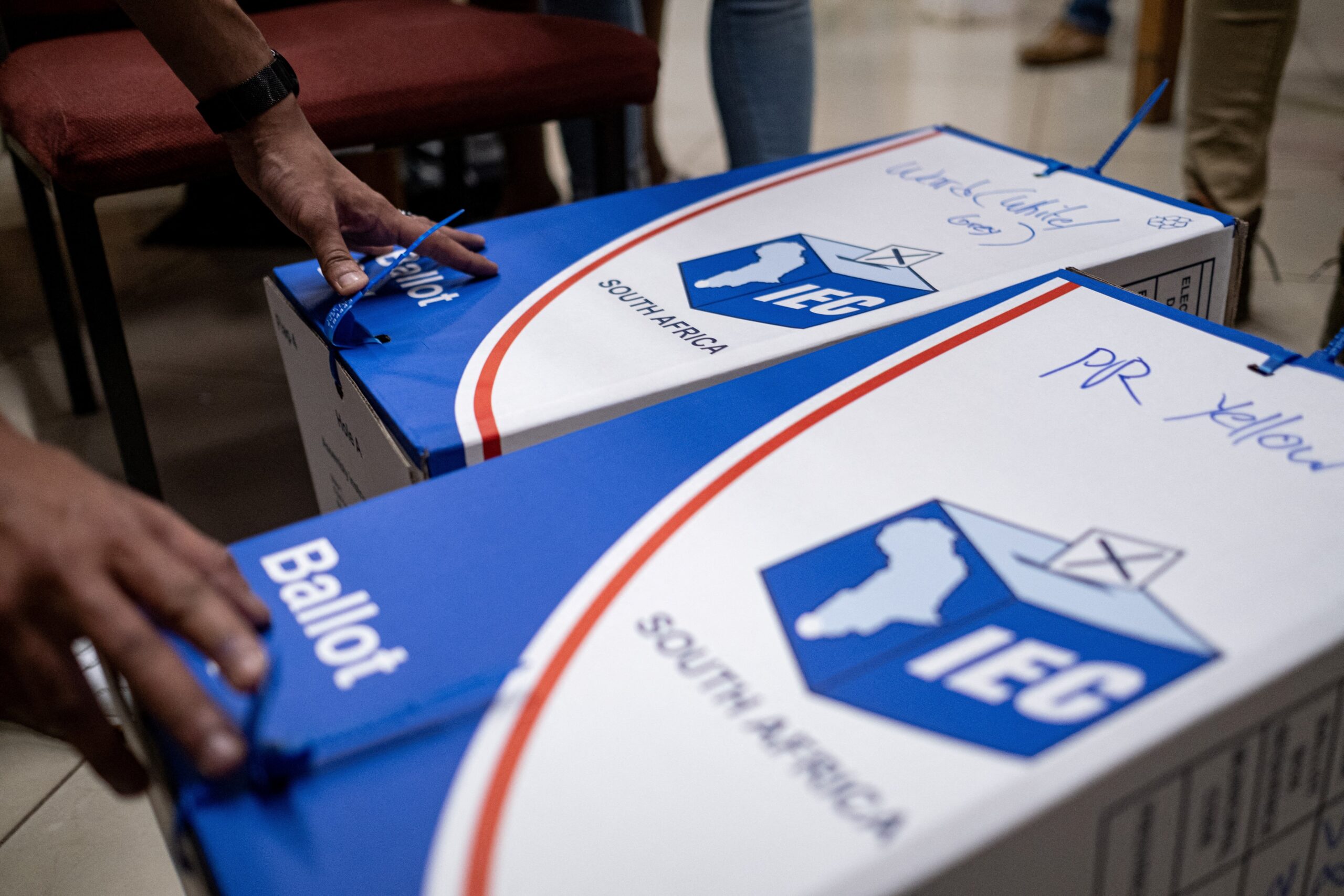
The results of an in-depth survey conducted by African Innovation Research SA (AIRSA) point to the country’s future being in the hands of coalitions and raise concerns about voter apathy, especially among the youth.
The initial sample comprised some 5 000 participants, of whom 46% confirmed they were either not interested in voting despite being registered or had not registered.
The majority of those surveyed by the independent research company based in Cape Town were in the 18–35 age group, a generation who are increasingly disillusioned with how the country is run.
The remaining 2 700 participants, who were interviewed from across a broad section of South Africa’s nine provinces, indicated that support for the ruling ANC is in decline, dipping below the 50% mark to 43% overall.
The ANC’s strongholds remain the Eastern Cape (61% of those surveyed), 58% in the Free State and 65% in Limpopo, where its challenger is the EFF at 23.7%.
In the country’s fourth-largest economy, Mpumalanga, the ANC leads with 52.3%, the EFF at 21.7% and the DA at 19.7%.
In the North West province, it’s a similar pattern, albeit reversed, with the ANC at 48.3%, the DA at 27.7% and the EFF at 20.0%, while in the Northern Cape, the ANC leads with 47.3%, followed by the DA with 24.3% and the EFF with 15.7%.
The country’s economic engine, Gauteng, is a key player in the power dynamics. Here, the ANC garnered 38.7%, but the EFF is growing its base to 19.3%, challenging the DA’s 20% of the province’s voters.
In the Western Cape, as expected, the DA holds onto a leading margin at 46.0%, with the ANC and EFF at 22.3% and 8.7% respectively. Gayton McKenzie’s Patriotic Alliance (PA) also features in the country’s southernmost province, making a notable showing at 5%.
While former president Jacob Zuma may have been barred from becoming a member of Parliament in the Constitutional Court this week, the new uMkhonto weSizwe Party (MKP) will play a pivotal role in KwaZulu-Natal. Results of the AIRSA survey show that while the ANC currently remains ahead with 28.7%, it’s an even race in the province with similar support for the IFP at 26.0% and MKP at 26.7%.
As experience dictates, the smaller parties will begin a series of bargaining tactics as to whose deck they end up in and call the shots.
At collectively accounting for around 20% of the upcoming vote, these potential coalition partners carry significant influence.
AIRSA also noted that voting in this sector is personality-driven as opposed to ideology.
The fragmentation of South Africa’s political landscape could also contribute to increasing dissatisfaction and disillusionment, particularly when linked to the country’s youth and increasing unemployment.
© IOL (Cape Times)
Politics
Zuma lashes out at judges after election ban
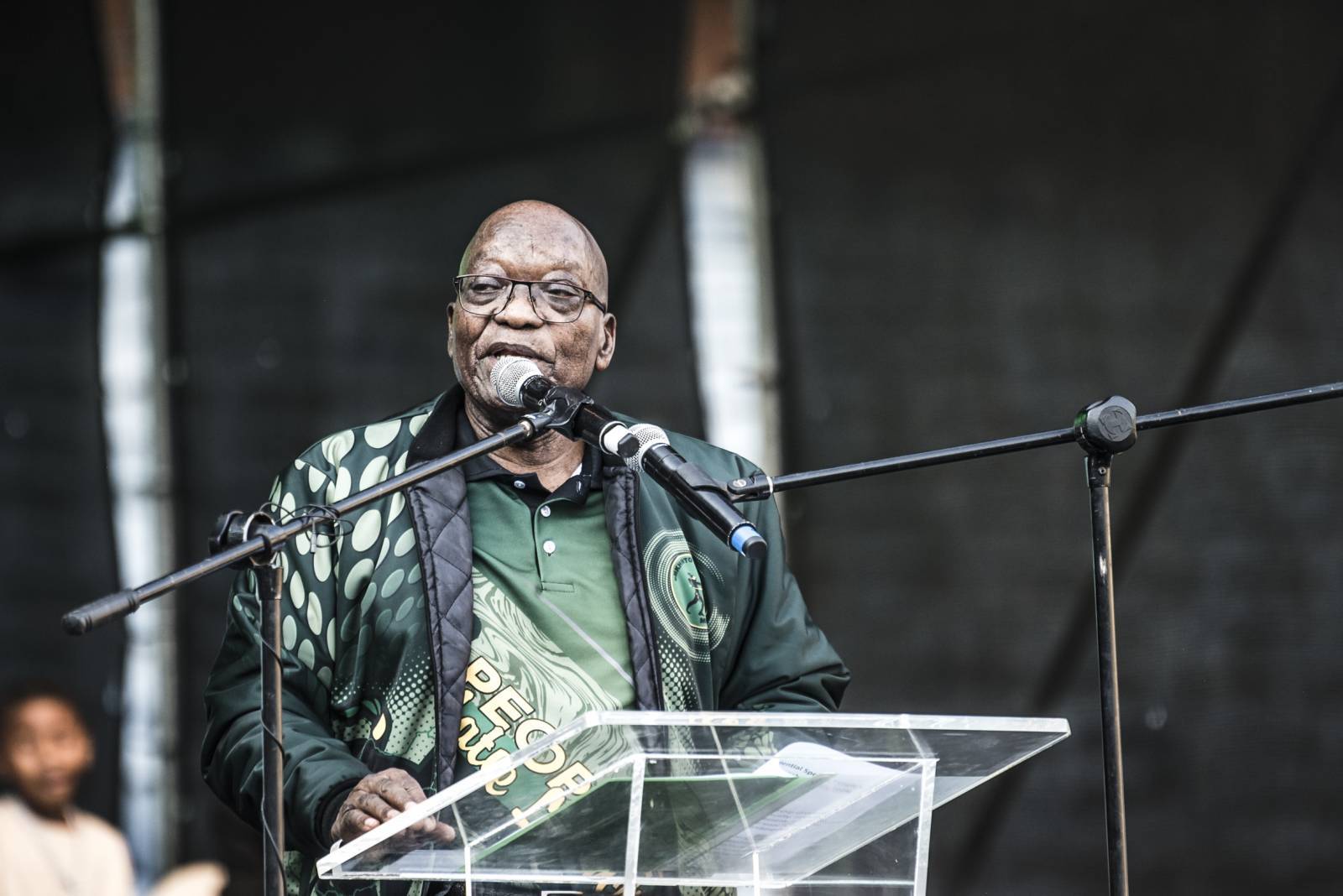
Former President Jacob Zuma has launched a scathing attack on some of the country’s top judges after he was barred from running for parliament on Monday.
In his first interview since the ban, Zuma told the BBC the Constitutional Court was wrong to decide he was unfit to run, based on his 2021 conviction for contempt of court.
“I expected that from our judges, but they are definitely wrong. Not correct,” the 82-year-old said, adding that the constitution should be changed.
Ahead of next week’s general election, Zuma had been campaigning under the banner of the newly formed uMkhonto weSizwe (MK) party.
He joined the party after falling out with the governing African National Congress (ANC), which he used to lead.
The electoral commission argued that the constitution bars anyone who was sentenced to more than 12 months in prison from serving as a lawmaker – a view backed by the Constitutional Court judges.
Zuma was convicted in 2021 for refusing to testify at an inquiry investigating corruption during his presidency.
His lawyers had insisted he was entitled to become an MP as his sentence was reduced to three months after current President Cyril Ramaphosa released him from prison in what was widely seen as an attempt to placate the former president’s angry supporters.
“The judges of the Constitutional Court have acted very funny to me – towards me in particular,” Zuma told the BBC.
“They are not taking into account the will of the people of this country, they use their own will.”
He was president from 2009 to 2018 before being forced out as leader of the ANC amid allegations of widespread corruption in his government.
The corruption, widely known as “State Capture”, saw hundreds of millions of rands of public assets taken into private hands. Zuma has always denied any direct role in corruption, but is due to face trial next year on allegations of bribery.
He told the BBC he had been wrongly stripped of his role as leader of the ANC.
“I don’t know what ‘State Capture’ means. If people say I am corrupt, what did I do? Do you have any facts about it? Am I guilty?
“I was removed before the end of my term, and nothing was produced as evidence that this was an issue.”
Zuma’s MK party had previously voiced its desire to change South Africa’s constitution, which was drawn up 30 years ago at the birth of the country’s democracy following decades of white-minority rule.
Asked about this in the light of his election ban, Zuma reiterated that the historic document needed to be changed.
“This constitution in the continent of Africa is guided by the laws from Europe, not us,” he said.
“There is nothing that has come right in this continent because we are still dominated by those who were the ones [who] slaved us, and after slavery, oppressed us, and after oppression, put their own laws to run us.
“There are details that clash with our lives.”
An Ipsos opinion poll released last month gave MK 8% of the vote, and the ANC 40% as it loses support to MK and other opposition parties.
But some analysts suggest that with the governing party stepping up its campaign in recent weeks, it could still cross the 50% mark. But if the ANC gets less than half of the vote, it would lose its majority for the first time in 30 years.
MK is expected to do especially well in Zuma’s home region of KwaZulu-Natal. Some opinion polls suggest it could emerge as the biggest party in KwaZulu-Natal, ending ANC dominance of the region.
After Zuma was jailed for contempt of court in 2021, angry supporters sparked days of deadly riots. More than 300 people were killed in the clashes.
On Wednesday Zuma said this violence demonstrated the scale of public support for him.
“This must tell you that the masses of this country loves Zuma – that’s why we had that,” he said.
When asked by the BBC if he would use this interview to call for peace and calm ahead of next week’s election, Zuma replied: “I’ve always done so.”
© BBC News
Current Affairs
Iran’s supreme leader leads prayers at Raisi funeral
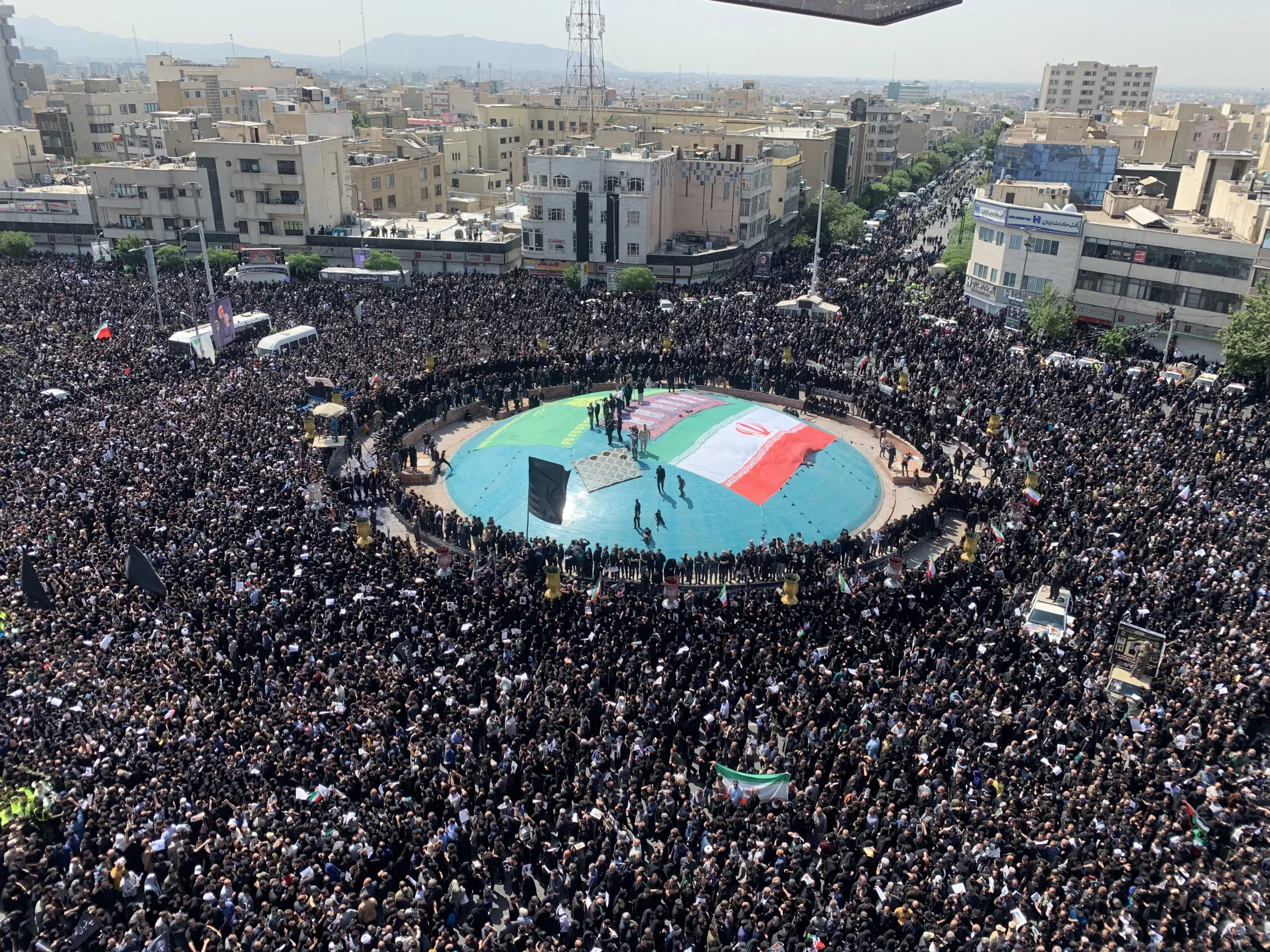
Iran’s supreme leader has presided over a funeral for the country’s late president, foreign minister and others killed in a helicopter crash on Sunday.
Ayatollah Ali Khamenei led prayers at Tehran University, where caskets carrying the dead were draped in Iranian flags.
President Ebrahim Raisi died alongside Foreign Minister Hossein Amir-Abdollahian and six others in a helicopter crash near the border with Azerbaijan.
Authorities had warned against demonstrations against the funeral procession and insults posted online.
“Oh Allah, we didn’t see anything but good from him,” Ayatollah Khamenei said in the standard prayer for the dead in Arabic.
Iran’s acting president, Mohammad Mokhber, stood nearby and openly wept during the service.
People then carried the coffins out on their shoulders, with chants of “Death to America” heard outside.
They loaded them onto a trailer for a procession through downtown Tehran to Azadi Square, where Raisi gave speeches in the past.
In attendance were top leaders of Iran’s paramilitary Revolutionary Guard, one of the country’s major power centres.
Also on hand was Ismail Haniyeh of Hamas, the militant group that Iran has armed and supported during the ongoing Israel-Hamas war.
Haniyeh is widely considered Hamas’s overall leader and has been a prominent member of the movement since 1980. The US Department of State designated him a terrorist in 2018.
“I come in the name of the Palestinian people, in the name of the resistance factions of Gaza…to express our condolences,” Haniyeh said.
He also described meeting Raisi in Tehran during Ramadan, the holy Muslim fasting month.
He said he heard the president say that “the Palestinian issue” remains the key one of the Muslim world, which “must fulfil their obligations to the Palestinians to liberate their land”.
He also claimed that Raisi called Hamas’ October 7 attack in Israel, which saw 1,200 people killed and 250 others taken hostage, an “earthquake in the heart of the Zionist entity”.
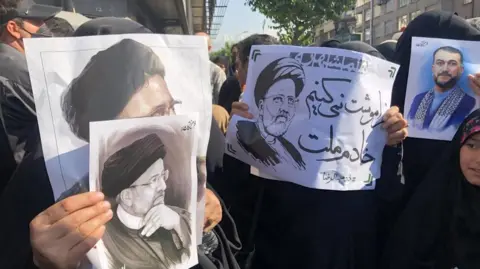
Also expected to attend services in Tehran were Pakistan’s Prime Minister Shehbaz Sharif and a delegation from the Taliban of Afghanistan, which included their Foreign Minister Amir Khan Mutaqqi.
Iran’s theocracy declared five days of mourning over Sunday’s crash, encouraging people to attend the public mourning sessions.
Typically, government employees and schoolchildren attend such events en masse, while others take part out of patriotism, curiosity or to witness historic events.
For Iran’s Shiite theocracy, mass demonstrations have been crucial to demonstrating the legitimacy of their leadership since millions thronged the streets of Tehran to welcome Grand Ayatollah Ruhollah Khomeini in 1979 during the Islamic Revolution, and also attended his funeral 10 years later.
An estimated one million turned out in 2020 for processions for the late Revolutionary Guard General Qasem Soleimani, who was killed in a US drone strike in Baghdad.
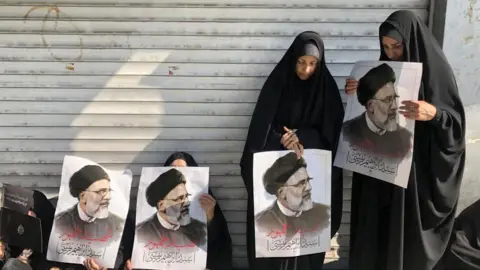
Across the capital, large banners were raised hailing Raisi as “the martyr of service”, while others bade “farewell to the servant of the disadvantaged”.
Some residents in Tehran received texts urging them to attend Wednesday’s ceremonies, the AFP news agency reported.
Footage carried by state TV showed streets filled with mourners, many of whom were carrying pictures of Raisi or the Iranian flag.
Funeral rites for the men began on Tuesday in the city of Tabriz and the Shiite clerical centre of Qom, where thousands of mourners attended ceremonies.
After Wednesday’s procession in the capital, Raisi’s remains will be moved to South Khorasan province, before being transferred to his home city of Mashhad in the northeast.
He will then be buried on Thursday evening in the city after funeral rites at the Imam Reza shrine.
Raisi, a hardline cleric, was a highly divisive figure in Iran. In the 1980s, he oversaw the execution of scores of opposition activists while working as a prosecutor.
He unleashed a brutal crackdown against demonstrators angered by the killing of 22-year-old Mahsa Amini in 2022. She died three days after she was detained by morality police in the capital for allegedly violating Iran’s strict rules requiring women to cover their hair with a hijab, or headscarf.
But his ultra-conservative outlook won favour with supporters of the regime, and Raisi was viewed as a possible successor to Ayatollah Khamenei.
© BBC News
Politics
Ireland to recognise Palestinian state
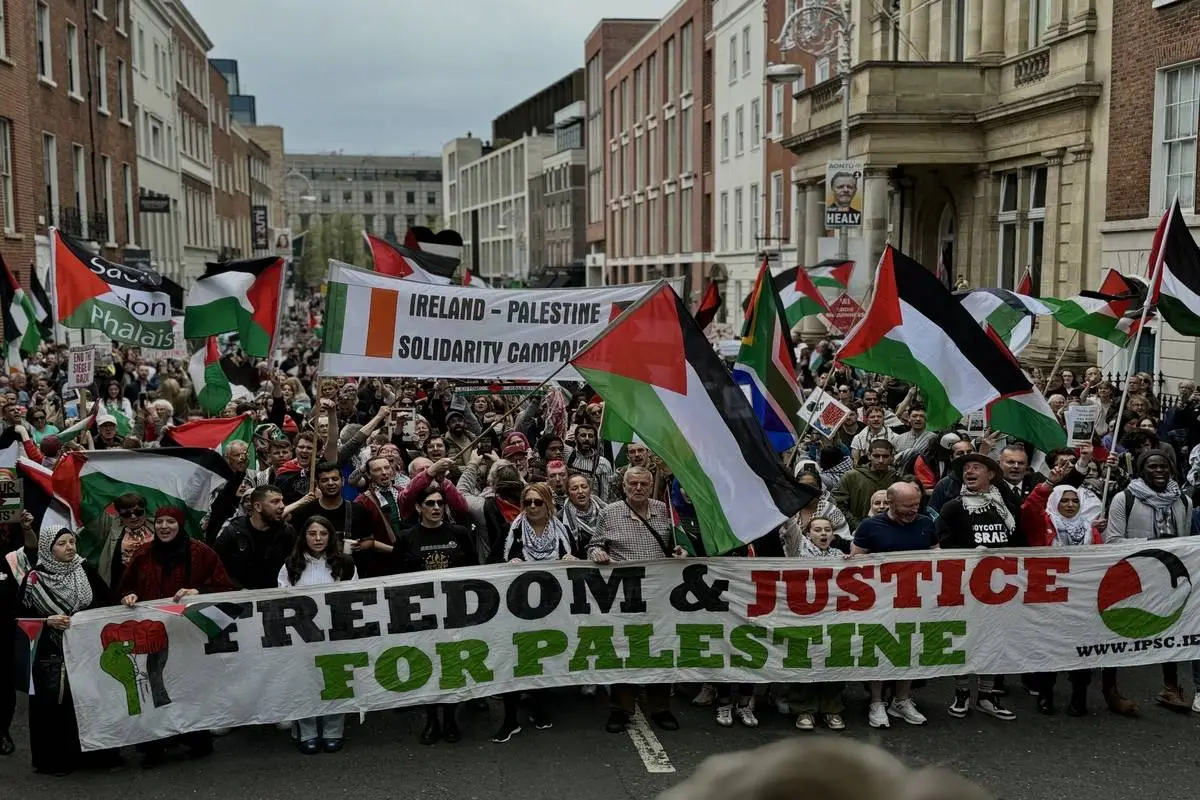
Ireland will recognise a Palestinian state, Prime Minister Simon Harris said on Wednesday, adding that he expected other countries to follow in the coming weeks after talking to world leaders.
“Today, Ireland, Norway, and Spain are announcing that we recognise the state of Palestine,” Harris said at a press conference.
“In the lead up to today’s announcement, I’ve spoken with a number of other leaders and counterparts and I’m confident that further countries will join us in taking this important step in the coming weeks,” he added.
He said a two-state solution was the only credible path to peace and security for Israel, Palestine and their peoples.
The recognition of statehood has particular resonance in Ireland given its history, Harris said.
“Taking our place on the world stage and being recognised by others as having the right to be there was a matter of the highest importance for the founders of our state,” he said.
He added that Ireland was unequivocal in fully recognising Israel and its right to exist “securely and in peace with its neighbours”, and he called for all hostages in Gaza to be immediately returned.
Ireland’s recognition of Palestine will be formally enacted on May 28, foreign minister Micheal Martin said on X.
© Reuters




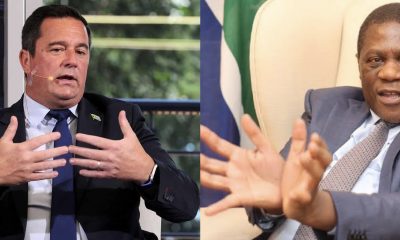










You must be logged in to post a comment Login